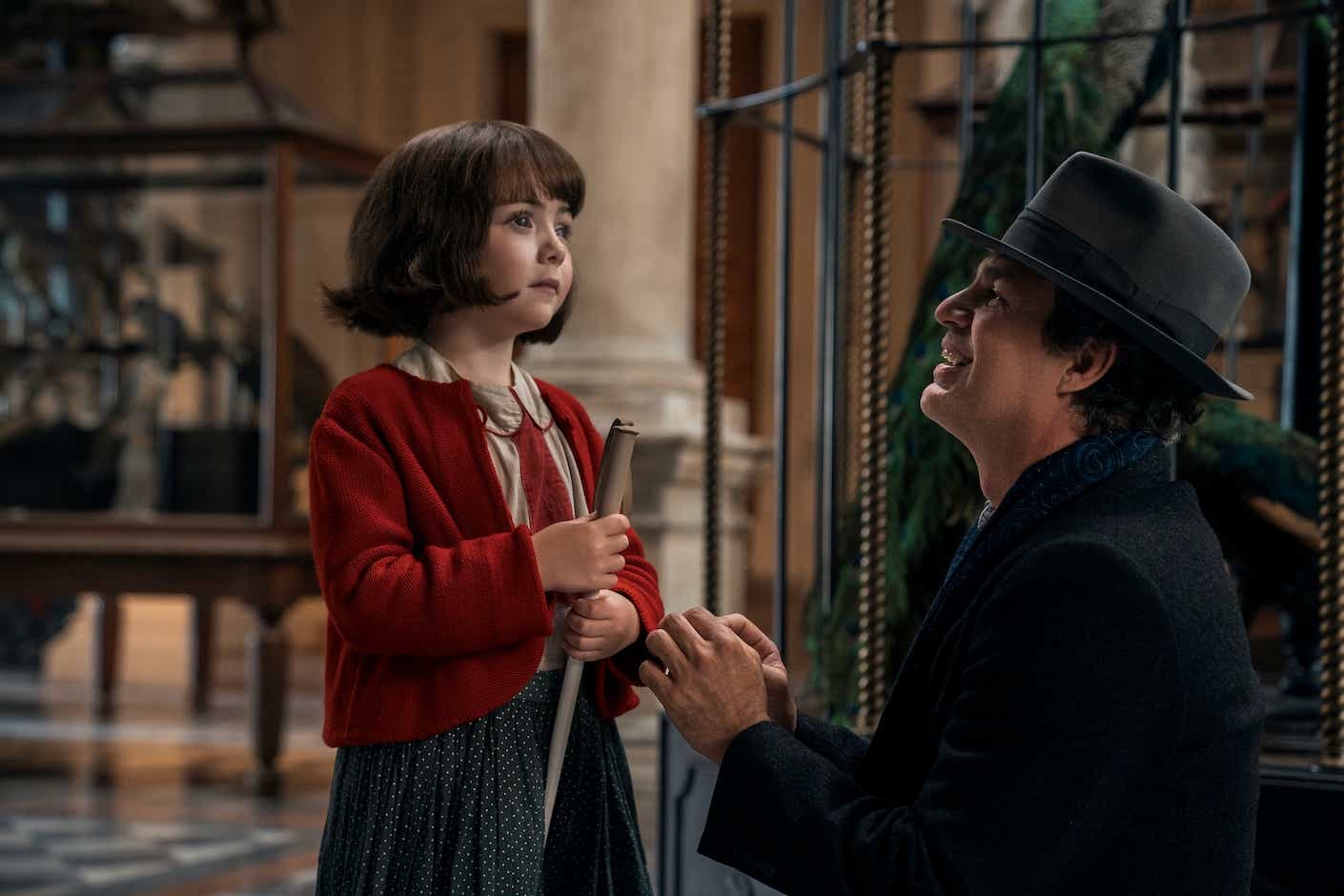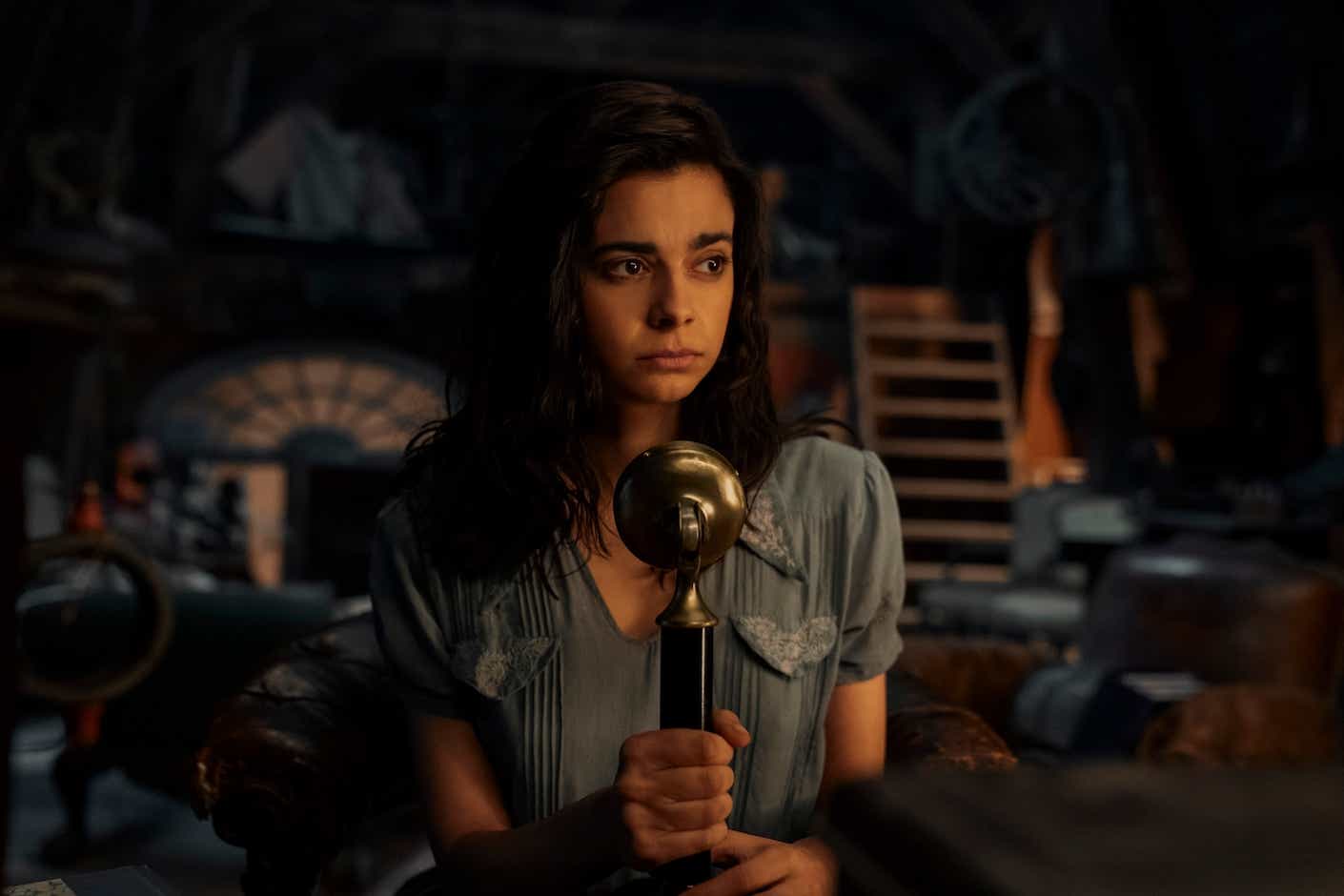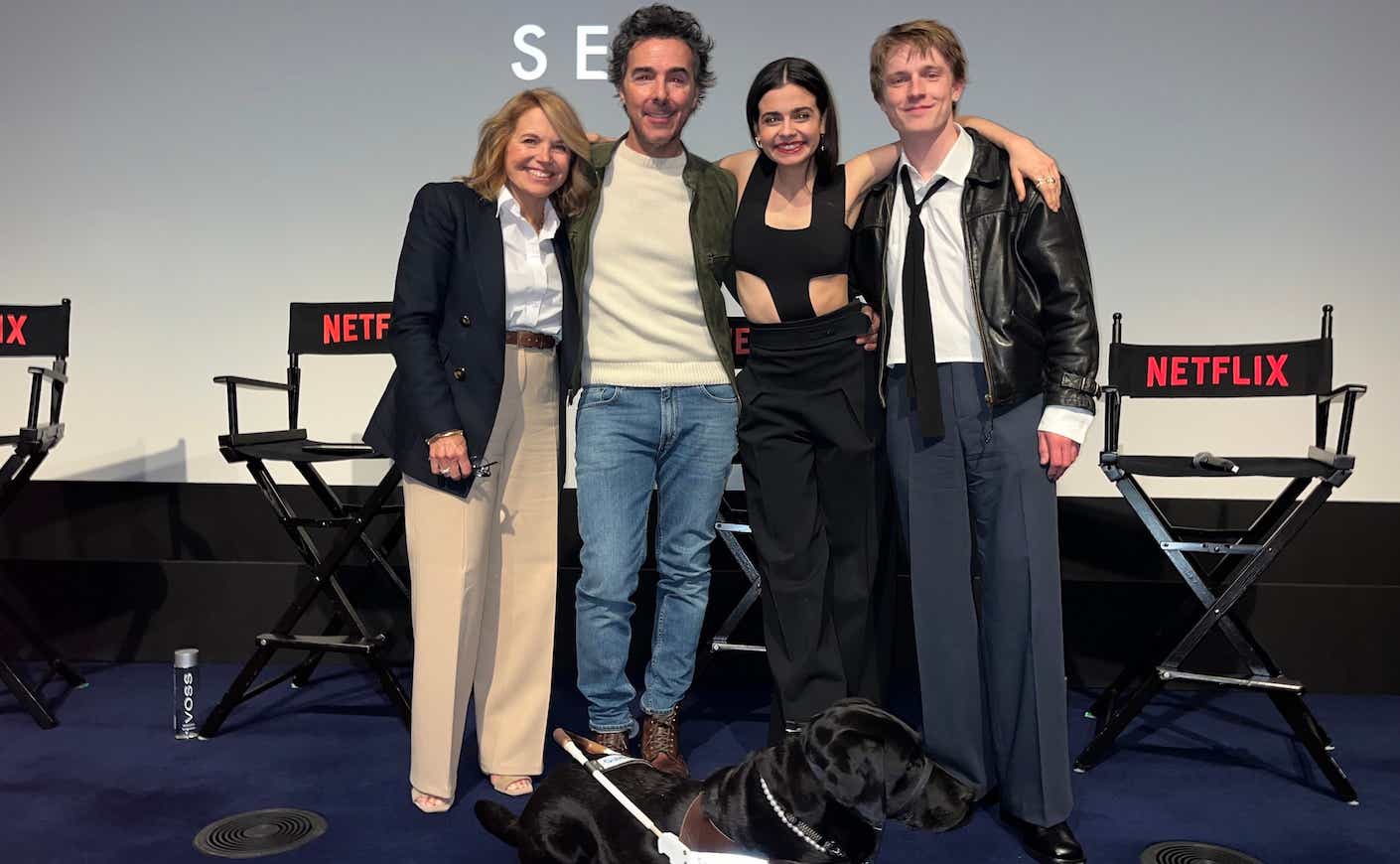In 2017, everyone was reading Anthony Doerr’s novel All the Light We Cannot See. Set in 1940s Paris, rural Germany, and the wartorn towns in between, the heartfelt story follows a blind girl fleeing from Nazis and a German orphan who’s recruited to fight the resistance. Sure, the novel won a Pulitzer Prize, but most of us were introduced to the tale via book clubs or vetted endorsements. No matter how we got there, we found ourselves entranced by the heart-breaking experience of life during World War II. The buzz was pervasive, so it seemed logical that a movie version would magically premiere within days. But the proposed film adaptation fell through, and the story slipped out of our minds for a while.
Now, director Shawn Levy (of Stranger Things fame) has taken on the challenge of adapting this epic story into a Netflix television series. Katie recently caught up with Levy — who was joined by co-stars Aria Mia Loberti and Louis Hofmann — during a special screening of the series to ask what it takes to bring such a massive and beloved project to life. They also delve into how Loberti used her own vision impairment to enrich the role and why even massive superstars like Mark Ruffalo and Hugh Laurie felt nervous to be on set.
Katie Couric: Shawn, it’s safe to say you’ve never tackled something quite like this before. A lot of people know you from Night at the Museum, Stranger Things, and The Adam Project. I know you’re in pre-production for Deadpool 3 right now, and you’ve been so successful in so many genres. But would you say this is a departure for you?
Shawn Levy: Without question. It’s a departure that I’ve waited a long time to try. I read this book when it first came out, as many of us did — I adored it and it moved me deeply. But at that time, the rights were unavailable because someone else was developing it as a movie. I was also at that point kind of known as the “Family Comedy Director,” not the period piece drama auteur. It wasn’t the first thing that sprung to mind, but I think like many of us, I wanted to see if I could do something more than I’d done. So this was a huge privilege.
When you take an incredibly popular novel like this, how much pressure was there for you to stay true to it? Did you feel at all restricted by that?
Shawn Levy: I did feel pressure, but I think the good news is I am as big a fan of the book as so many people are. So I knew that if I did right by the material, as a fan of the book, other fans of the book would be happy with the work as well. So I trusted that inner barometer.
You treated the source material with a lot of reverence.
Shawn Levy: I think that’s why they tried and failed to turn it into a movie. I think it’s too dense to do as a two-hour story. Doerr built such a complex and suspenseful intercut structure. I always thought it was almost romantic in the way it follows these two young characters separately, but almost destined to intersect. I tried to honor what was on the page of the novel and to adapt it into this different form.
I know you did a global search for the character of Marie. Can you talk about that process and why Aria was ultimately chosen?
Shawn Levy: It’s a process that changed me. I decided early in pre-production that the right way to do this story was to do it with authenticity, which meant casting young and grownup Maries, who would not be guessing at what that experience is or approximating what that experience is. But who had navigated the world and come of age with the unique experience of either low vision or blindness.
So we put out a global casting announcement. We got hundreds upon hundreds of auditions, people in their dorm rooms, people in their bedrooms, people in their living rooms, some sighted actors, some non-sighted actors, and many non-actors. One of whom was a Fulbright Scholar, Ph.D. candidate in rhetoric at Penn State, who sent in a recording from her dorm room. And it was one of the hundreds that I watched. And as soon as I saw it, I was like, “What am I seeing? I think I found it.” And then I met Aria.
Aria, you’ve received your master’s in ancient rhetoric at the University of London on a Fulbright scholarship. You’re getting your Ph.D. in ancient rhetoric at Penn State. I was going to describe you as a smart cookie, and then I realized men are never called cookies. So I’m just going to say you’re damn smart. What was your reaction when you got the role? Take us back to when you heard the news. It’s such a fairytale story.
Aria Mia Loberti: It feels like it’s a made-up story even more so than the fantasy of the film or the book. I had a speech prepared about how grateful I was that Shawn was looking to cast a blind actor in this role. I worked on it with my mom and I was like, “I figured out that I really love acting. I would love to learn how I might be able to be involved with community theater and maybe how I can boost my confidence.” I had this lovely speech and I didn’t get to give it because I got on Zoom with Shawn and he said something along the lines of, “There are lots of moments in our lives that change you, but then there are moments where your lives just change completely. It’s not you that’s changing, it’s your life that’s changing. This is one for you.”
Shawn Levy: Aria’s first words were, “Could we call my parents?” Aria and I are on Zoom and I call her mom and dad. Because I said, “You want to call them?” She was like, “I can’t dial. I don’t know what’s happening!”
Louis, this is not your first rodeo like Aria. I mean, you’ve done a lot of acting already. What was it that attracted you to the role? How was it different from anything you’d done before?
Louis Hofmann: I didn’t know the book, but I got instantly interested when I looked it up. I did the auditions and I came in early to work on radios to prepare for the character. What got me interested in it was he was very sensitive, but it’s this genius of knowing how to handle and build radios from scratch. That is his absolute gift, but it becomes a burden to him. He suffers under the regime, under the circumstances of society, and is dragged into the cruelty of war. But he constantly fights against that and fights for the good. He fails and fails but keeps on trying. I think that was so beautiful about the character. That’s what had me instantly intrigued.
As I watched this, the depravity of the Nazis was reinforced. I’m curious if any of you felt there were some chilling parallels between what was happening in that period of history and what you’re seeing happen today.
Shawn Levy: Did you see the episode where Daniel and Marie have to leave Paris suddenly? That’s based on an actual day in June of that year. Something like 2 million Parisians just started walking. We had extras in that scene, including [Aria’s] mom, and including Ukrainian refugees who had walked into Hungary from Ukraine, headed west toward uncertainty to escape an invading army from the east.
Meanwhile, we’re filming a scene about an exodus west to run away from an invading army. Frankly it’s deeply saddening that this history is being replicated and replayed in some ways that are so blatant and so appallingly horrific. To be telling this story in a part of the world where that was local was quite chilling. After the Russian invasion of Ukraine, we wrote some scenes where the professor is talking about the tyrant and the invasion of cities. We wrote them specifically to lean into the horrifying timeliness of this story. And the rise in anti-Semitism and authoritarian regimes that are taking over all over the world. It’s sort of too upsetting to be true, but I think it does make a very timely impression.
To be able to comment and shine a light on the kind of repetitiveness of the worst sides of human nature — at least as a creative team — we knew that was a privilege.

Mark Ruffalo and Hugh Laurie are not here, but obviously, they’re huge names. For these young actors, what was it like working with people of that stature? Were they nice or were they jerks? I’m just kidding. But what was it like?
Louis Hofmann: It was an absolute privilege to work with them. Hugh is a master of his craft. He’s the absolute nicest person on the planet and the funniest as well. We would always mock his accent on set.
Aria Mia Loberti: [Mark Ruffalo] really took time with me so that we could sell the relationship and make it beautiful. What a good human being. He’s just a treat to work with and a wonderful mentor. What I really appreciate as a newcomer is that Mark, Hugh, Louis, and the rest of our cast all had nerves, too. I wasn’t the only one who was nervous.. I figured by the time you make it to this level, you must have it all together.
Shawn Levy: I think part of it is we take this source material really seriously.
There are examples of things that I would not have known about the experience of being blind. If Aria didn’t tell me, Mark, Hugh, and Louis every day, “Oh no, that’s actually the way blindness is represented. That’s not an authentic lived experience.”

Can you give us an example of that?
Aria Mia Loberti: One of the best moments was on my very first day. I was filming my very first scene, which is the first scene of the show. I was changing the character’s eye line because my experience is very different from this character. I always simulate eye contact. I have enough vision that sometimes I can make it truthfully, but you always simulate it.
I’ve been taught that you have to be accepted by the sighted world. You’re going to use your gaze. I, as Aria, was doing that. Then Shawn and I had this really nice conversation about why that’s a trait and why that may not be communicated well enough to an audience who might not be exposed to an experience of blindness.
How can we communicate it better? This young girl, her father is teaching her the ways of the world. She doesn’t have everything we have at our disposal. She doesn’t have the technology, she doesn’t have an iPhone, she doesn’t have teachers to teach her orientation and mobility techniques. She wouldn’t know that. So this is an interesting way to communicate. If I [touch] the radio dial, my gaze is going to remain here as opposed to following the hand.
Shawn Levy: We were in Tribeca when we first met in person. I was noticing how Aria was reaching for her tea. I remember saying, “You’re using the back of your hand.” And Aria taught me that day, “We don’t use our fingertips. If we use our fingertips all the time, there’s a sensitivity to it.”
Aria Mia Loberti: You would maybe get injured. I’m not a braille reader, but for my character, there’s a sensitivity to the fingertips that’s very particular.
I’m curious if there are other things that you hope you’ll be able to communicate to an audience about blindness that they may not be aware of.
Aria Mia Loberti: Even as someone who loves history and has really deep-dived into the book to bring the authenticity of the story to the table, anyone with a physical disability is going to be very different from time period to time period. More so than the average person. The cane technique, like a white cane, would’ve been only five to 10 years old at this point. It really only would’ve been used for identification. So she is learning as she’s doing it. Whereas kids nowadays, if you’re born with your eye condition like I was or if you go blind during your school years, you have training every week that you take as a supplementary class.
You learn braille, you learn all of these techniques. She didn’t have any of that. So her braille is very sloppy because she wouldn’t have had a teacher telling her to glide her finger over the page. She’d be scrubbing, as you see in the opening. The hand grip on the cane is totally different. I’m not a cane user anymore, so that was a new territory for me, but I had to use a cane full-time until I qualified for a guide dog. Which is an opportunity she would never have had.
Shawn Levy: Every day, all of us learned new details that we only could have learned because we approached telling a story in this way.









